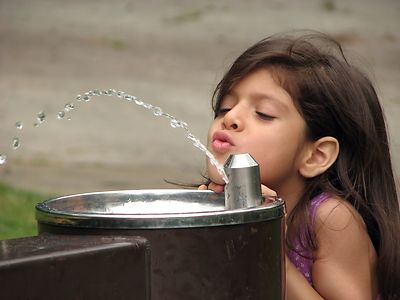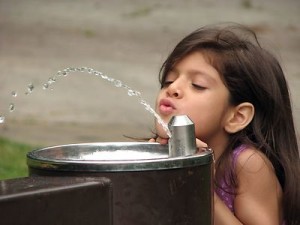Where does your agua come from?

If you missed it, recently there was a news story from ProPublica about Mexico drilling into a deep aquifer for drinking water. The catch, as the article notes, was that in the US, the same type of aquifers are considered so unlikely to be used for drinking water that they are not really regulated as such—leading to easy contamination. As the article notes:
“U.S. environmental regulators have long assumed that reservoirs located thousands of feet underground will be too expensive to tap. So even as population increases, temperatures rise, and traditional water supplies dry up, American scientists and policy-makers often exempt these deep aquifers from clean water protections and allow energy and mining companies to inject pollutants directly into them.”
This matters because water is often compared to as the “next oil”. There may be problems with that analogy, but a take-away point is a diminishing access to potable water due to pollution or climate change.
We have already seen how water contamination most likely affects disadvantaged communities (i.e. low-income communities of color).
So the question to pose to you, dear Latino reader: can you answer where the water you drink comes from?
This is an important question because many of use generally take for granted turning on the tap or finding bottled water at the neared convenience store or supermarket.
And often it is that convenience that masks what a valuable resource water is and how often we are careless with it—a resource that keeps us alive.
There are several issues to consider, ranging from the privatization of drinking water supplies, to a crumbling public water infrastructure, to the diverting use of water for manufacturing and resource extraction.
For years in Latin American and communities in the US there have been some battles over the privatization and commercialization of water. In the Western United States, water is tied to a long history of conflict and struggles, affecting many Latino and Hispano communities.
But the question comes back, where does your water come from?
The answer matters because you may be directly or indirectly casting your vote for the kind of system we want, the kind of laws we value, and the types of protections we want on our water systems.
If you regularly drink bottled water, it may be because you have to if your local source has been polluted—and you need to consider how to respond to that. If you choose bottled water in places with good municipal sources, you may be lining the pockets of corporations at the expense of local utilities—the irony being that some bottled water comes from municipal sources and municipal sources are often better regulated than bottled water. There is also the whole issue of what we do with those plastic bottles…
If your water comes from wells and aquifers, it is important to pay attention to what activities could affect that quality—could it be fracking? Could it be farm runoff? Is it being depleted faster than it could be restored?
If your water comes via a distribution system fed by snowpack, what affects that snowpack? How reliable is it? How is climate change affecting it?
If your water source is connected to key ecosystems such as a delta, river, or other important watershed, then how is that ecosystem affected? If it is destroyed, how does it affect the water quality? Do we need to construct filtration systems because we have damaged the ones nature has in place?
The list could go on.
But the point is that we expect to have clean drinking water while we may not always be aware, or have the time and privilege to think about where our water comes from, what it takes to get it to us, and what affects it along the way.
As Latinos it should matter to us. Many Latino communities struggle with access to clean water and there is a history of water issues affecting Latino communities. But we also have the ability and opportunity to affect these issues in positive ways—in California this was highlighted last year with the signing the “Human Right to Water Act”.
So next time you turn on the tap, would you able to answer where your water comes from? And more importantly what is being done to conserve that water and protect its source?
[Photo by Benjamin Miller/Freestockphotos.biz]

